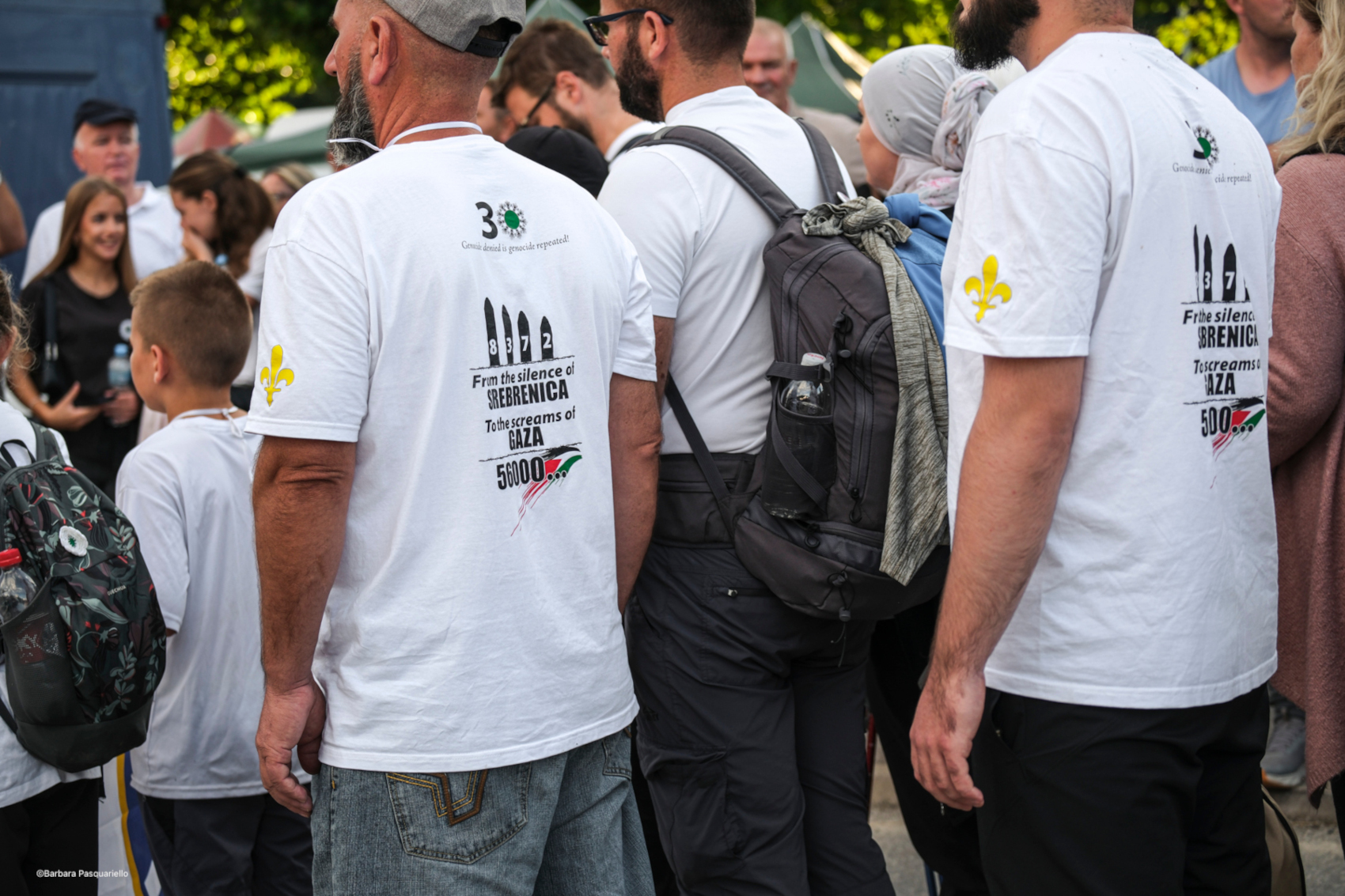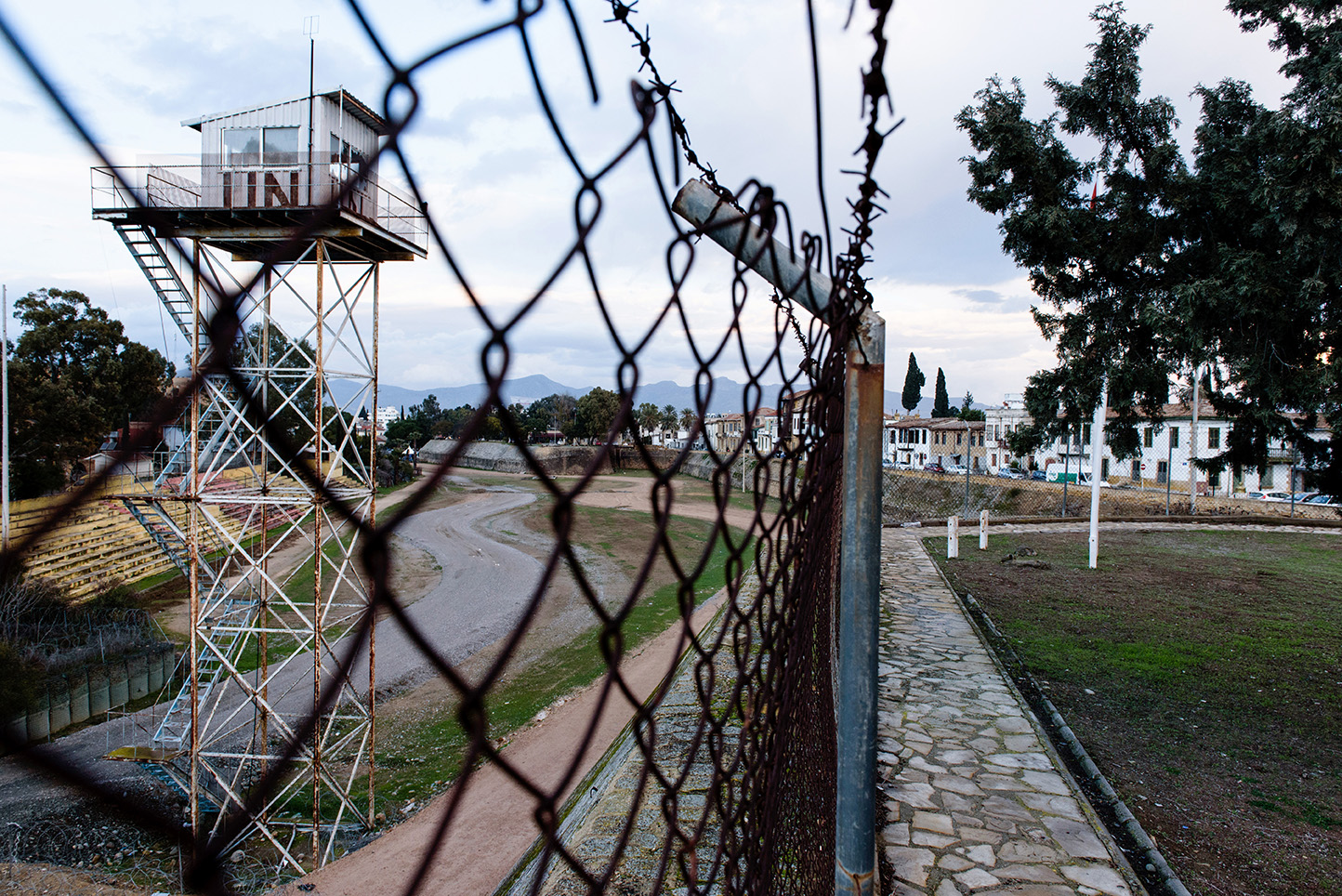From Srebrenica to Gaza, from genocide to genocide
Thirty years after the Srebrenica genocide, we are witnessing another genocide unfold live-streamed. What we once fought for, and the institutions born out of that earlier tragedy, have failed to prevent the obliteration of Gaza. A reflection by Luisa Chiodi, Director of OBCT, and a heartfelt appeal not to surrender to resignation

Da-Srebrenica-a-Gaza-di-genocidio-in-genocidio-1
T-shirts in solidarity with Palestinian victims: "8,372 from the silence of Srebrenica to the screams of Gaza 56,000" © photo Barbara Pasquariello
Paralyzed by anguish, in recent weeks I have been unable to find the strength to write commemorations for the thirtieth anniversary of the Srebrenica genocide. I could not bring myself to indulge in rhetoric about European complicity while we are witnessing, in live streaming, another genocide, with the evident material and political support of our own country as well.
Years ago, when at OBCT we began producing the first reflections on how to deal with the past, it was already clear that the rhetoric of “never again” was becoming little more than an empty ritual. But who among us could have imagined witnessing, powerless, the erasure of Gaza?
In the 1990s, in the early stages of the wars of Yugoslavia’s dissolution, the International Criminal Tribunal for the former Yugoslavia (ICTY) was established, enabling the prosecution of ideologues and direct perpetrators of crimes against humanity at the highest political and military levels. Certain aspects of its legal framework troubled us at the time, such as plea bargains even in cases of genocide. Yet the ICTY undoubtedly carried out essential work in reconstructing the historical truth of what took place during those wars.
Moreover, the ICTY experience gave new impetus to international criminal law, and as a direct consequence, the International Criminal Court was founded in Rome—an institution that today should be prosecuting not only Putin and Netanyahu but also figures such as Almasri and all those who commit grave violations of human rights worldwide.
International law—historically an instrument of the powerful, serving in particular the purposes of Western colonization—was beginning to evolve into a tool at least partly available to the weak, much as fundamental rights function at state and EU level .
What helps to keep alive the convictions of the past is the extraordinary work of Francesca Albanese , UN Special Rapporteur on the Occupied Palestinian Territories, scandalously targeted with personal sanctions by Trump’s United States.
Even the occasional advances of universal jurisdiction allow us to cling to hope that all is not lost—as shown just a few weeks ago when two Israeli soldiers were arrested in Belgium on charges of crimes against humanity for their actions in Gaza.
And yet it is profoundly difficult not to feel crushed by the reality that it is Western countries themselves that are draining of meaning the international order laboriously built in the eighty years since the end of the Second World War.
Commemorating the genocide of Srebrenica undoubtedly holds immense value in helping survivors work through grief. But beyond the hope of “never again” and of international law as a deterrent, even the post-war policy of reconciliation is undergoing a profound crisis.
The experience of Srebrenica suggests that achieving legal recognition of genocide and commemorating its victims has not translated into a real transformation of Bosnia and Herzegovina. The political situation remains tense, the risk of secession by the Republika Srpska—an entity born out of the genocide—looms large, and the country is still paralyzed by the long-term consequences of that tragedy. The issue is that Bosnia and Herzegovina has not yet managed to articulate a vision for the future that recognizes the ideology that led to the catastrophe, that is to say, ethnic nationalism.
In her moving Piedi freddi , Francesca Melandri reflects on the difference between guilt and collective responsibility, adding an important dimension by recalling the retreat of the Italian army from the Soviet Union— which was mostly a retreat from Ukraine, where today people fight to defend themselves from Russian aggression, as the author reiterates in the book. Guilt, in criminal law, is individual, while collective responsibility should concern both the duty to transmit the memory of the past across generations and the commitment toward the future. This is what we should be able to do in Kyiv as in Gaza.
Bringing perpetrators to justice, commemorating victims to ease survivors’ pain, and — aware of the past and present responsibilities of one’s own political, ethnic, or state community — assuming responsibility for the future: these are our tasks.
But what kind of future? Sadly, here our thoughts turn to the bleak political landscape of the country reborn from the ashes of the Shoah: Germany, once we admired for its reckoning with the past. It is dismaying to realize that German redemption has in fact materialized in blind, unwavering support for Israel—as though the guilt for one people’s extermination could be absolved through relentless defense of the right to an ethnic state for survivors, at the cost of destroying another people.
Where imagining the future is difficult, we cannot allow ourselves to despair. We must move beyond horror at what is unfolding. We must resist resignation in the face of the dystopian world taking shape before our eyes.
For Ukraine, in response to Russia’s large-scale aggression since 2022, the EU has launched the process of European integration, though fraught with obstacles and contradictions.
For Palestine, instead, the task falls to grassroots mobilisation: a broad grassroots movement is necessary to ensure that our country and the European Union cease to be complicit in genocide. We should join initiatives to boycott Israel and its enablers, and support those striving to make real the dream of establishing in Palestine a democratic state , homeland for all its inhabitants—from the river to the sea—without discrimination.
As Ahmed Eldin reminds us, solidarity with the oppressed is not a sentiment but a choice, a moral and political obligation to be embraced without fear of the price it may entail.
In the 1990s, internationalist commitment was strong and met fewer obstacles than today. Civil society believed it could compensate for the failures of our governments. With fewer technological resources, media coverage was in fact better, and activists did not face the police repression now directed against those demonstrating in solidarity with Palestinians. Let us not forget that in offering assistance to civilians during the Bosnian war, four Italian activists lost their lives in different circumstances .
The brutality, the senseless cruelty, the blind violence we witnessed thirty years ago—and are witnessing once again today—is humanity’s own story, one we cannot surrender to. Burdened by the weight of history and aware that we may fail again, we cannot exempt ourselves from the struggle for justice and the universal protection of human rights. For today, more than ever, in the interconnected world we inhabit, the dehumanization of some heralds the destruction of all humanity.









